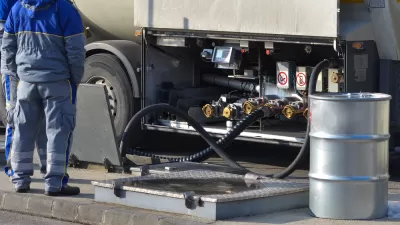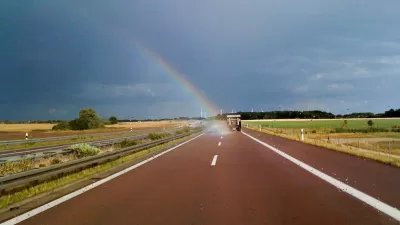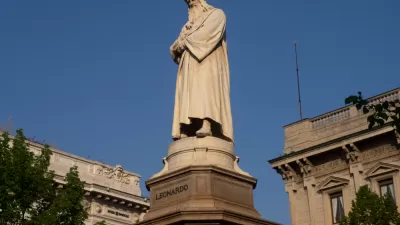News of the GOP's rejection of a gas tax increase comes from reports on two recent private meetings between Republican leaders and the Trump Administration.

for The Washington Post on
The discussions underscore the difficulty Trump faces as he seeks to finance his 2016 campaign promise of a $1 trillion national infrastructure upgrade...The White House is expected to release an infrastructure plan as soon as this month, but that plan is not expected to dictate how the projects would be paid for..
White House officials said they still have not made a final determination as to whether they will pursue an increase in the gas tax, even though GOP leaders have made clear an increase will not have enough Republican support to become law.
Nor should Trump expect help from Senate Minority Leader Chuck Schumer (D-NY) who told the Daily Beast that he opposes hiking the gas tax to finance the president's infrastructure plan, reported Sam Stein on Nov. 23, 2017.
“The bottom line is that we don’t want to raise taxes on working people right now,” Schumer said. “As it stands now that is where we are at. Income distribution is so bad, I would rather pay for infrastructure by taking the money that comes from overseas [repatriation] and putting it into infrastructure.”
Former Transportation Secretary Ray LaHood, who now serves as co-chair of Building America’s Future, a bipartisan coalition dedicated to infrastructure investment, called Schumer’s remarks shortsighted.
Not entirely ruled out
White House aides have said the president’s broader infrastructure plan would be designed with $200 billion in federal funding and rely on states, localities, or private investors to cover the remaining $800 billion, but Trump has waffled on this, saying he doesn’t believe partnerships between the federal government and private investors would work.
And states will need to be careful on how they finance their share of infrastructure projects, as illustrated by the administration's threatened rejection of the all-important Hudson River rail tunnel project due to New York's and New Jersey's reliance on borrowing from the federal government.
Opposition to increasing gas tax not shared by GOP governors and state legislatures.
Last year, eight states increased their gas taxes, most of which had GOP governors and/or GOP-controlled state legislatures:
California, Tennessee, Montana, Indiana, South Carolina (overriding a governor's veto), Utah (more of an adjustment), West Virginia and Oregon.
However, it was an odd-numbered year; don't count on many this year.
Hat tip to AASHTO Daily Transportation Update.
FULL STORY: GOP leaders reject gas tax increase after Trump floats the idea

Study: Maui’s Plan to Convert Vacation Rentals to Long-Term Housing Could Cause Nearly $1 Billion Economic Loss
The plan would reduce visitor accommodation by 25,% resulting in 1,900 jobs lost.

North Texas Transit Leaders Tout Benefits of TOD for Growing Region
At a summit focused on transit-oriented development, policymakers discussed how North Texas’ expanded light rail system can serve as a tool for economic growth.

Why Should We Subsidize Public Transportation?
Many public transit agencies face financial stress due to rising costs, declining fare revenue, and declining subsidies. Transit advocates must provide a strong business case for increasing public transit funding.

How Community Science Connects People, Parks, and Biodiversity
Community science engages people of all backgrounds in documenting local biodiversity, strengthening connections to nature, and contributing to global efforts like the City Nature Challenge to build a more inclusive and resilient future.

Alabama: Trump Terminates Settlements for Black Communities Harmed By Raw Sewage
Trump deemed the landmark civil rights agreement “illegal DEI and environmental justice policy.”

Dear Tesla Driver: “It’s not You, It’s Him.”
Amidst a booming bumper sticker industry, one writer offers solace to those asking, “Does this car make me look fascist?”
Urban Design for Planners 1: Software Tools
This six-course series explores essential urban design concepts using open source software and equips planners with the tools they need to participate fully in the urban design process.
Planning for Universal Design
Learn the tools for implementing Universal Design in planning regulations.
City of Santa Clarita
Ascent Environmental
Institute for Housing and Urban Development Studies (IHS)
City of Grandview
Harvard GSD Executive Education
Toledo-Lucas County Plan Commissions
Salt Lake City
NYU Wagner Graduate School of Public Service





























